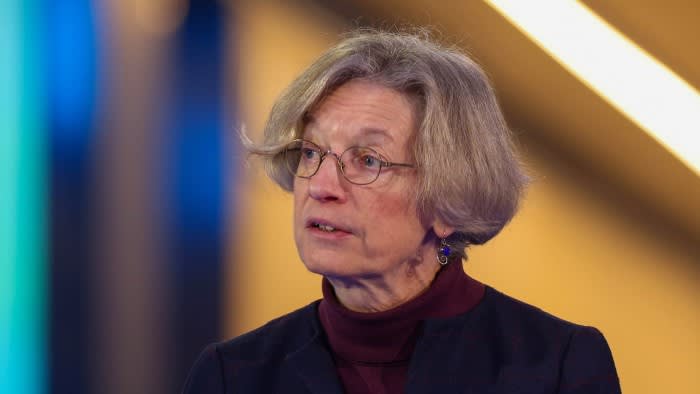Unlock the Editor’s Digest for free
Roula Khalaf, Editor of the FT, selects her favourite stories in this weekly newsletter.
A six-year freeze on personal tax thresholds has been a big factor holding back growth in the UK economy, a Bank of England rate-setter warned on Thursday, days before Rachel Reeves is expected to extend the policy in the Budget.
Catherine Mann, an external member of the BoE’s Monetary Policy Committee, said people on middle incomes had been hard hit by the effect of income tax and national insurance thresholds being fixed in cash terms, coming on top of higher mortgage costs and consumer prices.
“This middle income group is an especially important one. They have been exposed to a relatively greater degree to tax-bracket creep. Under inflation, more of this group had more of their income creep into a higher tax bracket. This is an important consideration for purchasing power in the current environment,” she told an event at the IMF’s annual meetings in Washington.
Mann said she was not making any comment on the October 30 Budget, where Reeves is expected to extend the freeze — first announced by the former Conservative government in 2021 — in a move that could raise £7bn a year, even with tax rates unchanged.
But she said the central bank had identified the existing freeze as “a significant drag” on growth, with its latest forecasts for the UK economy, published in August, singling out fiscal policy as “an important ingredient in the slowdown in economic activity associated with that forecast”.
She added that this was one reason UK growth prospects remained “pretty modest” even after this week’s upgrade by the IMF, which now expects Britain’s GDP to grow by 1.1 per cent in 2024, up from 0.7 per cent previously, and 1.5 per cent in 2025.
“Consumer behaviour really is the linchpin,” Mann said, noting that middle income households in the UK were still saving more than before.
“In the past, I’ve said that’s dry powder for consumption going forward,” she added, but it was also possible that people felt “scarred” by recent experience and now felt the need to have a higher savings buffer.
Since “fiscal drag” does not involve changing headline rates, it has generally not provoked the public opposition generated by more explicit tax-raising measures.
However, the UK’s freezes are bringing more people into paying income tax. Two-thirds of the adult population is set to pay income tax in 2027-28, compared with 58 per cent before the freezes started, according to the Institute for Fiscal Studies think-tank. The number of people paying higher rates of income tax has more than doubled since 2010.
The squeeze on middle-income households could also lessen inflationary pressures, however. Mann, who has voted against interest rate cuts at recent BoE meetings, said she was watching prices for “things that really are discretionary” for this group — including restaurants and package holidays — to judge whether service price inflation was easing.
Mann described the last month’s drop in inflation as “good news”, with the headline rate undershooting the BoE’s forecasts at 1.7 per cent and services inflation below 5 per cent “for the first time in a very, very long time”.
But reinforcing comments made on Wednesday by BoE governor Andrew Bailey, she said there was still “a long way to go” before services inflation returned to levels consistent with headline inflation remaining durably at the 2 per cent target.



